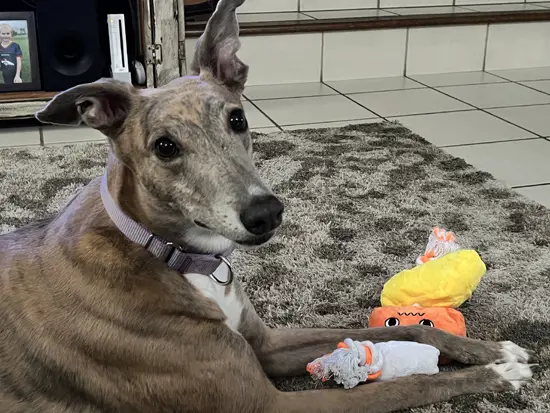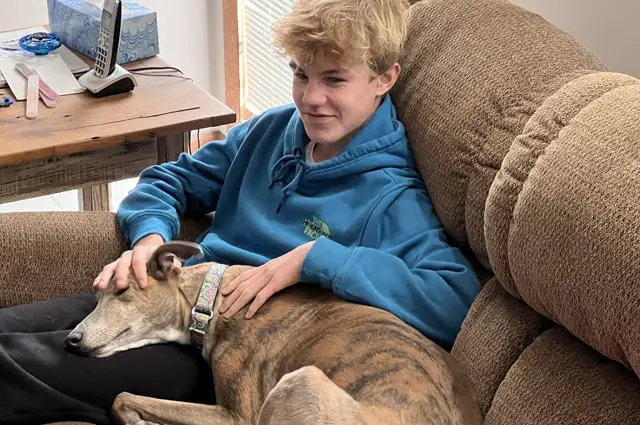When it comes to Greyhounds, you might wonder if these graceful and fast dogs are aggressive by nature. One of the questions I asked the rescue was are Greyhounds aggressive? The answer I got was a bit complicated and we learned more as we got to know our Greyhounds.
I wanted to talk about the various factors that may contribute to a Greyhound’s behavior, including their upbringing, socialization, and individual personalities. Both of our Greys had very different personalities and one was more aggressive than the other, although it was very minor aggression.
By understanding aggression in Greyhounds and taking some advice from someone like me who has lived with Greyhounds, hopefully you have a better understanding of what you can expect.
Keep in mind that each Greyhound is unique, and generalizations may not be what you experience. However, we’ll explore the typical characteristics of the breed and give you some hands-on info from my family and our experiences.
So, let’s dive into the world of Greyhounds and learn more about their possible assertive traits.
Table of Contents
Greyhounds Are Typically a Gentle Breed
Greyhounds are a unique and fascinating breed. As racing dogs, they are known for their incredible speed and athleticism. But, what about their temperament? Can they be as aggressive at home as they are on the track?
You might be surprised to learn that Greyhounds are actually quite gentle and friendly dogs. Despite their large size, they are known for their calm and affectionate nature. They enjoy spending time with people and are typically very good with children too.
For those that know our Greyhounds Gill and Brittany from our other posts you’ll know that they are very different from each other. Gill was probably the one that was a bit more strong and firm and Brittany is considered more chill. But overall both were also quite gentle in nature.
While Greyhounds were originally bred for hunting and racing, they are not typically an aggressive breed. They do have a natural instinct to chase small, fast-moving objects, like rabbits and squirrels, but are not normally hostile or nasty in any way.
Greyhound Temperament
You might be wondering about the temperament of Greyhounds and whether they are aggressive or not. You’ll be pleased to know that Greyhounds are known for their calm and gentle demeanor. They are not aggressive by nature and are instead remarkably docile with people and other animals.
Greyhounds are incredibly polite and well-mannered companions. They are loyal and affectionate with their families and are very amicable with new people.
Their quiet and relaxed disposition makes them perfect pets for peaceful households. You can also expect a Greyhound to be friendly and sociable with other dogs, making trips to the park enjoyable and stress-free.
In general, Greyhound temperament embodies everything you might look for in a calm, relaxed, and easygoing pet. There are obviously some Greyhounds out there that won’t be picture perfect pets. But, the breed as a whole (and from my personal experience) is a great example of a friendly, gentle companion that your entire family will come to love.
It’s rare I see a Greyhound that is not friendly and gentle overall.
Aggressive Greyhounds Do Exist, But Are Rare
When it comes down to it, Greyhounds are very calm docile dogs but as you would expect, any specific dog can have behavioral problems. Think of a classroom of young children. You’re always going to have 1-2 kids that are more resolute than the others. Same with dogs and Greyhounds in particular.
In the case of Greyhounds, they have been primarily bred for racing and chasing. This means that their instinct is to pursue prey, which can sometimes be triggered around smaller animals such as cats or rodents.
However, this does not necessarily translate to aggression towards people, kids or other dogs.
My Personal Experience with a Slightly Aggressive Greyhound
When it came to our Greyhound Gill, we knew of his aggression issues right from the start. For one, he was a loner and often wanted to wander away and be by himself. Not typically a sign of aggression, but it definitely was a red flag at first.
When he first came to our home, we learned quickly that he wouldn’t allow certain things. One of those was tummy rubs. We were warned by the guy that fostered him that he wouldn’t tolerate long tummy rubs. Yep, red flag.
A few days later I got a little too close to Gill’s face when he was lying in his bed and he snapped at me. Just a few inches from my face so my guess is he didn’t want to hurt me. Just a warning sign to stay out of his area I guess. Lesson learned and I did warn everyone in the home to give Gill his space as he got to know us and that we were friends.
As a responsible dog owner, you should take steps to manage any potential aggression such as this. Socializing your dog with other people and your family members is super important to ensuring that any aggression like we experienced with Gill is minimized.
How to Handle These Aggressive Behavior Issues In Greyhounds
It’s essential to keep in mind that a dog may also become aggressive if they feel threatened, scared, or cornered. In such cases, you should ensure that your Greyhound feels safe and secure and give them time to acclimate to new situations and environments.
My bet is that Gill was a bit upset that I was in his personal space so in hindsight that was not a great idea.
That being said, here are a few tips to help you deal with an aggressive Greyhound:
- Provide proper socialization with other dogs and people from a young age.
- Regular exercise and mental stimulation to keep them healthy and content.
- Positive reinforcement training to establish good behavior.
- Ensure your dog has a safe and secure environment.
- Seek professional help, such as a dog trainer or animal behaviorist, if aggression becomes a concern.
- Make sure when you first have your adopted Greyhound in your home that you give them the space they need to feel comfortable.
Remember, it is crucial to understand that not all Greyhounds are overly aggressive, but it’s necessary to monitor their behavior, especially around other animals and new situations. By taking the time to learn about your Greyhound’s unique temperament and addressing any potential aggression issues, you can help ensure a harmonious and happy life with your furry friend.
Common Signs of Aggression in Greyhounds
Greyhounds are known for their gentle and affectionate nature, but like any dog breed, they may display signs of aggression in certain situations. As a responsible Greyhound owner, it’s important for you to recognize these signs and to address them so your Greyhound learns what is acceptable behavior and what is not.
Here are a few signs that your Greyhound might have some aggression issues. Some of these are pretty obvious, but worth mentioning for sure:
Is Your Greyhound Growling and Snarling?
If your Greyhound starts growling or snarling, it’s a clear sign that they feel threatened or uncomfortable. They may make these noises when they feel their space is being invaded or when they are guarding “their things” such as food, toys, or even their favorite spot to lie in.
Is Your Greyhound Barking Loudly?
While Greyhounds aren’t necessarily known for barking, they may resort to loud, aggressive barking if they feel cornered or threatened. If your Greyhound begins barking loudly at a person or another animal, that is a definite red flag and it needs to be addressed.
Does Your Greyhound Snap at People or Bite?
Greyhounds are not prone to biting or snapping, but these behaviors can be very obvious signs of aggression. Anything to do with biting and exposing their teeth or even making snapping or biting motions is not normal and signs of something wrong.
If your Greyhound does any of these things, it’s super important to address the issue and ensure that the dog and anyone around them remains safe.
Again, most of these are obvious signs of an aggressive dog or behavioral type issues but they need to be addressed if they start happening frequently.
I let our boy Gill get comfortable in our home, but as time went on whenever those growling or barking issues occurred we did our best to stop it in its tracks.
What Could Cause Greyhound Aggression?
When it comes to Greyhounds, it’s important to understand the triggers or things that might be causing the aggression. By being aware of these triggers, you can better manage your Greyhound’s behavior and ensure everyone including your dog is safe.
Territorial Behavior and Greyhounds
One common trigger for aggression in Greyhounds is territorial behavior, sort of like what I experienced with Gill. Your dog may become defensive or display aggression if they feel their personal space is being invaded. This is very common in Greyhounds as many experienced owners will tell you.
If you put yourself in your Greyhound’s position, most of them come from the track and never “owned” anything. Most probably didn’t have their own toys or bones to chew so a lot of them probably fought for those things with all of the other Greyhounds.
That territorial behavior to a degree could end up being an issue in your home for sure.
Dominance
Another factor that can contribute to aggressive behavior is dominance. It is natural for dogs to establish a hierarchy within their pack.
If your Greyhound feels their status is being threatened in your home, whether amongst family members or other pets, they might show signs of aggression to assert their position. Always pay attention to their body language and the way they interact with other dogs or people.
Do Loud Sounds or Voices Affect Your Greyhound?
Greyhounds, like all dogs, can be sensitive to certain loud voices or even loud sounds like from fireworks. Even loud, high-pitched, or angry tones from adults or even babies can trigger anxiety or fear in your Greyhound.
It’s important to maintain a calm, even tone when speaking to your Greyhound to minimize the risk of eliciting a fear-based response. And doing all you can to avoid loud sounds in your home can also help with anxiety and aggression.
Does Your Greyhound Have a History of Trauma?
Previous trauma can also result in aggressive behavior in Greyhounds. Past experiences, such as abuse or neglect, may make them more susceptible to anxiety and fear.
Be patient and understanding with rescued Greyhounds as it may take some time for them to adjust to their new surroundings to feel secure.
Does Your Greyhound Suffer From Fear or Anxiety?
Greyhounds may show signs of aggression when they are scared, stressed, or unsure about a situation. One thing many dog owners experience is separation anxiety, which is a specific type of fear-based aggression that can affect Greyhounds in particular.
If your Greyhound becomes anxious when left alone, they may exhibit some signs of aggression like barking and howling.
Is Your Greyhound Showing Signs of Frustration?
Lastly, frustration can trigger aggressive behavior as well in Greyhounds. If your Greyhound is prevented from doing something they desire, such as playing with a toy or going for a walk, they might become frustrated and act out.
We didn’t see this very often with Gill or currently with our Greyhound Brittany, but just understand that dogs do get frustrated like humans and can lash out aggressively given the situation.
Remember that not all Greyhounds will show their frustrations in the same way so learn about your dog and understand the trigger so you can remedy it. Try to be patient, kind, and always maintain a friendly tone when interacting with your Greyhound as most of these types of aggressions can be fixed over time when handled correctly.
Can Greyhounds Be Aggressive With Children?
The quick answer to this is YES, Greyhounds can be aggressive towards children. Like any dog, sometimes you’ll encounter a Greyhound that deals better with adults than they do with children.
Are Greyhounds Good With Young and Older Children?
We’ve been very lucky to have two Greyhounds that have been very tolerable of our kids in different age groups over the years. Our boy Gill was very good in general with our kids when they were very young.
Our son was 5 years old at the time and our daughter was just 8 years old and Gill got along with them very well outside of a few times where Gill got a little rambunctious.
Brittany the Greyhound was much different and way more calm with the kids then even Gill was. She arrived in Summer 2020 and our kids by that point were 11 years old and 14 years old and also had experience with a Greyhound thanks to our time with Gill.
Brittany was very much more calm and she loves playing with the kids too. Never had an issue and she’s truly a non-aggressive Greyhound and the biggest sweetheart you’d ever meet.
So I would say that in general and from my experience, kids and Greyhounds do get along very well. They have a calm temperament and can be quite loving towards their child friends, both older and younger. No doubt, Greyhounds can be great companions for children.
Are Greyhounds Good With Toddlers and Infants?
Although we don’t have experience with toddlers or infants and Greyhounds, I would recommend that you always supervise interactions between your child and any dog. Most Greyhounds are in that 55-75 lb range so that weight difference is always the most important thing to understand.
Add that to a Greyhounds prey drive and you might have your Greyhound trying to run after your little one in the family room. Remember that they were bred for hunting and racing so if your child is running in or crawling around the house, your Greyhound’s instincts might kick in and the chase is on!
To avoid any potential accidents, it’s a good idea to train both your Greyhound and your toddler age child in how to interact with each other. For example, teach your child not to pull the dog’s tail or ears and show them how to pet the Greyhound gently.
Similarly, work with your Greyhound on basic obedience skills, especially when they’re around your kids.
Greyhounds often enjoy the company of children and love to cuddle with them. As long as appropriate boundaries are established, a Greyhound can be an amazing addition to your family.
Just remember to keep an eye on their interactions and help both the dog and child learn how to safely interact with each other.
Other Frequently Asked Questions
Q. Do Greyhounds have a history of attacking humans?
No, Greyhounds do not have a significant history of attacking humans. They are generally known for their gentle and friendly temperament. However, like any dog, individual Greyhounds may have different personalities, and aggression can result from various factors such as fear, frustration, or past experiences.
Q. Are Greyhounds suitable family pets?
Yes, Greyhounds make the absolute best family pets and are known for their calm and gentle nature, which is ideal for families with or without children. They do require daily exercise but also enjoy relaxing with their human companions which makes them perfectly suitable family pets.
Greyhounds are also super couch potatoes so they may run around with your family for a while, but they love snuggling on couches at night too.
Q. How do Greyhounds interact with children?
Greyhounds are typically good with children and can make wonderful family pets. They are patient and gentle, which is great for households with kids. However, it’s essential to teach your children how to properly interact with the dog and supervise their interactions to ensure everyone’s safety.
Q. Can Greyhounds be aggressive towards other pets?
Generally, Greyhounds get along with other dogs, especially if they are socialized from a young age. They might have a strong prey drive due to their racing background (if any), which may cause them to chase smaller animals.
It’s important to introduce your Greyhound to other dogs gradually to create a positive experience.
Greyhounds and cats also quite often get along and can be best of friends.
Ask your Greyhound Rescue or Foster Family more about the Greyhound you’re interested in as they normally test the Greyhounds for many different things including their ability to get along with other animals.
Summary – Are Greyhounds Aggressive Dogs?
So when it comes to Greyhounds, they are typically very calm and docile and in a majority of situations they make the best dog pet you could ever have. If you read about Greyhounds online and ask owners how they feel about their Greyhounds, most like myself and my family, couldn’t live without them.
Of course there are always bad apples out there. But when it comes to Greyhounds they are few and far between. You don’t often hear about a Greyhound that was a bad family member. Most of the time you hear the complete opposite.
However, there are times when Greyhounds can become slightly defiant and it’s the human’s job to ensure we teach them appropriately. Especially when they’re around children of any age.
Make sure you keep an eye on your Greyhound from the moment they come into your home to ensure everyone is getting along. If teaching or corrective actions are needed, do so right away to stop bad habits from forming.
It’s never OK to have your Greyhound chase around your toddlers in your home or bark and growl. Those are things that need to be corrected right away.
In the end, adopting a Greyhound into your family is one of the best things you can do. We’ve had nothing but great experiences with our Gill and Brittany and I really think a defiant Greyhound is not something you’ll see very often, at least from our personal experience.








